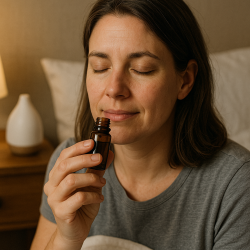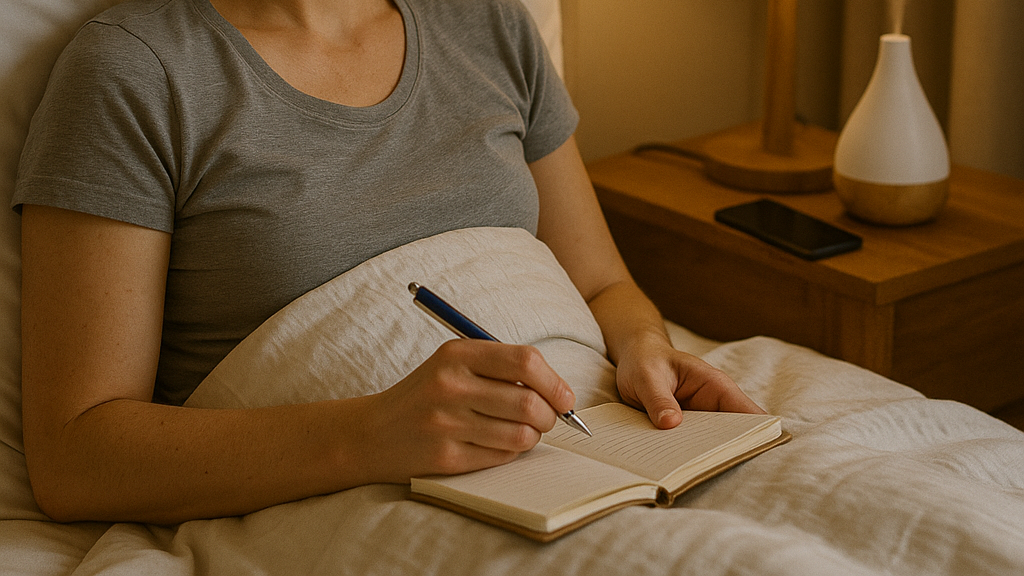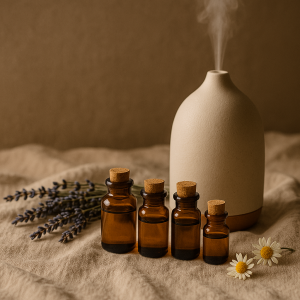Contents
- 0.1 Can Essential Oils Really Help You Sleep?
- 0.2 Why Aromatherapy for Sleep Has Gained Popularity
- 0.3 The Best Essential Oils for Sleep Aid(That Actually Work)
- 0.4 How to Use Essential Oils for Sleep Aid (Without Overthinking it)
- 0.5 Rituals That Reinforce Your Sleep Routine
- 0.6 Does the Science Back It Up?
- 0.7 Tips for Buying and Storing Essentials Oils
- 0.8 Are There Any Risks?
- 0.9 Can You Mix Oils Together?
- 0.10 Real Users, Real Sleep Gains
- 0.11 Key Takeaways
- 0.12 Final Thoughts
- 1 Don’t miss these tips!
Can Essential Oils Really Help You Sleep?

Maybe you’ve tried melatonin, cutting caffeine, or blue light glasses, and still find yourself wide awake at midnight. You’re not alone. More and more people are now exploring Essential Oils for Sleep Aid – What Works as a natural, calming alternative to harsh sleep meds.
It’s not just another wellness buzzword or TikTok trend. Aromatherapy for sleep, especially using lavender oil for sleep, has centuries of tradition behind it—and a growing body of science to back it up. But the big question remains: can essential oils really help you fall asleep faster and stay asleep longer?
Let’s dive into the science, the stories, and how to get started (without turning your bedroom into a spa brochure).
Why Aromatherapy for Sleep Has Gained Popularity
We’re living in a time where burnout is the norm, and sleep is treated like a luxury. According to the CDC, 1 in 4 adults don’t get enough sleep. I bet you don’t get enough sleep more days out of the week. That’s where aromatherapy for sleep comes in-not as a cure, but as a supportive tool.
Here’s why it works for so many people :
- The olfactory system(your sense of smell) is directly linked to the brain’s limbic system-home of emotion and memory.
- Specifically, certain scents trigger parasympathetic nervous responses, reducing heart rate, blood pressure, and stress.
- It creates a ritual-something your brain can associate with winding down.
The key is choosing the right oil and using them consistently.
The Best Essential Oils for Sleep Aid(That Actually Work)
Not all oils are created equal when it comes to catching zzz’s. Here are the ones backed by both science and sleepy fans:
- 🟣 Lavender Oil for Sleep
Lavender is the rockstar of the sleep world—and for good reason. Multiple studies have shown its ability to lower heart rate, blood pressure, and anxiety. Moreover, one study published in the journal Frontiers in Behavioral Neuroscience found that inhaling lavender improved deep sleep and increased slow-wave sleep in participants.

💬 “I started diffusing lavender oil before bed, and it’s honestly made a bigger difference than melatonin ever did. I fall asleep faster and don’t wake up as much during the night.” – Chloe D., 34
How to use: Diffuse 5-8 drops 30 minutes before bed, or add 1-2 drops to your pillow(on the underside of the case to avoid direct skin contact).
- 🌿 Roman Chamomile
Earthy, grounding, and often overlooked. Cedarwood contains a compound called cedrol, which promotes calm and reduces sympathetic nervous system activity.
Great for people who don’t like floral scents but still want the benefits or essential oils for sleep aid.
- 🌸 Ylang Ylang
Floral and exotic, ylang ylang is known for its mood-stabilizing properties. In addition it helps reduce blood pressure and anxiety, setting the stage for a peaceful night.
Try blending it with lavender or cedarwood for a more complex scent.
How to Use Essential Oils for Sleep Aid (Without Overthinking it)
One of the most beautiful things about aromatherapy for sleep is that it’s simple. But there are a few do’s and don’ts
✅ Top 4 Effective Ways to Use Them
- Diffuser: add 5-10 drops of your chosen oil to a water-based diffuser 30 minutes before sleep.
- Pillow Mist: Mix a few drops with distilled water and a little witch hazel in a spray bottle.
- Topical: Dilute with carrier oil(like jojoba or almond oil) and apply to temples, wrists, or soles of the feet.
- Bath soak: add 4-6 drops to a warm bath with Epsom salts.
❌ What Not to Do
- Don’t apply essential oils directly to your skin without dilution- they can cause irritation.
- Don’t use oils near pets or babies without researching safety.
- Don’t overdo it. Start with small amounts and tent your reaction.
Rituals That Reinforce Your Sleep Routine
Essential oils work best when they’re part of a wind-down ritual. Think of it as setting a scene your brain associated with sleep.
Here’s one example:

- 🕯️ Dim the lights
- 📖 Put your phone away
- 🛁 Take a warm bath with chamomile oil
- 💨 Diffuse lavender and cedarwood blend
- 📝 Do a quick 3-line journal entry
- 😴 Lie down and focus on slow breathing
💬 “My bedtime ritual feels like a signal to my body now. Once I start diffusing lavender, it’s like my mind just starts to let go.” – Martina S., 29
Does the Science Back It Up?
Yes-and it’s growing
- For example, a 2025 study in the Journal of Alternative and Complementary Medicine found that lavender oil improved sleep quality in college students with self-reported sleep issues.
- a 2021 meta-analysis in Evidence-based Complementary and Alternative Medicine concluded that aromatherapy significantly improved sleep quality across diverse populations, including the elderly and those with chronic illnesses.
- Roman chamomile has been shown to decrease anxiety symptoms in postpartum women and elderly patients both of whome often experience insomnia.
While results vary by person, the evidence is pointing in a promising direction.
Tips for Buying and Storing Essentials Oils
Because essential oils aren’t strictly regulated, quality matters.
What to look for:
- 100% pure, therapeutic-grade(avoid synthetic fragrances)
- Dark glass bottles(protects from light degradation)
- Latin name of the label(e.g., Lavandula angustifolia for lavender)
Storage Tips:
- Keep in a cool, dark place
- Tightly sealed to avoid oxidation
- Don’t store in the bathroom – humidity breaks them down faster
Are There Any Risks?
Essential oils are generally safe, but a few precautions go a long way:
- Always Dilute before applying to skin.
- Test a small patch first to check for allergic reactions.
- Consult your doctor if you’re pregnant, nursing or on medications.
- Be cautious if you have pets- some oils like tea tree and eucalyptus can be toxic for animals
💬 “I used to apply oils directly to my skin until I got a rash. Now I dilute with coconut oil, and it’s smooth sailing.” – Karen M., 38
Can You Mix Oils Together?
Absolutely. Blending essential oils can enhance their effectiveness ad personalize your aromatherapy experience.
Here’s a calming sleep blend to try:

- 4 drops Lavender
- 2 drops Cedarwood
- 2 drops Roman Chamomile
- 1 drop Ylang Ylang
Use in a diffuser or mix with 2 tablespoons of carrier oil for a massage blend.
Real Users, Real Sleep Gains
We asked everyday people how essential oils have impacted their sleep



🗣️ “After I started using essential oils for sleep aid, I went from lying in bed for an hour to falling asleep within 15 minutes.” – Jason B., 40
🗣️ “It’s not magic, but it helps me feel calmer before bed, which makes a big difference.” – Samantha K., 27
🗣️ “I didn’t believe it at first, but now I won’t sleep without my diffuser on.” – Neha R., 35
Key Takeaways
- Essential oils for sleep aid can support better sleep by promoting relaxation and lowering stress.
- Lavender oil remains the most studied and reliable choice.
- Aromatherapy is most effective when used consistently as part of a bedtime routine.
- Choose high quality oils and use them safely(especially when applying to skin).
- Blends and rituals make it more enjoyable and sustainable.
Final Thoughts
If you’re stuck in a cycle of late nights and groggy mornings, adding essential oil for sleep aid to your nightly routine might be the missing piece. Its not about replacing medical treatments-it’s about creating space for your mind and body to wind down naturally.
Event if you’re skeptical, tying it for a week won’t hurt. Worse-case? Your room smells amazing, Best-case? You finally sleep like you used to.
🛏️ Ready to try it? Pick a blend, light-proof your room, and start tonight.
Sources for Research & Quotes
- Lillehei, A. S., & Halcon, L. L. (2014). A systematic review of the effect of inhaled essential oils on sleep. Journal of Alternative and Complementary Medicine.
- Koulivand, P. H., Ghadiri, M. K., & Gorji, A. (2013). Lavender and the nervous system. Evidence-Based Complementary and Alternative Medicine.
- Itai, T., Amayasu, H., et al. (2000). Psychological effects of aromatherapy on chronic hemodialysis patients. Psychiatry Clin Neurosci.
- Mayo Clinic. “Aromatherapy: Is it worthwhile?” (2023)
- Frontiers in Behavioral Neuroscience – Lavender odor-induced activation of the parasympathetic nervous system and sleep enhancement.
